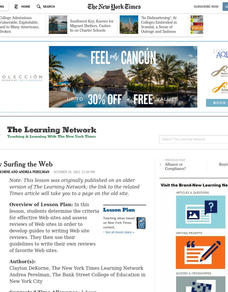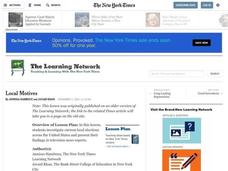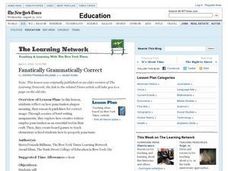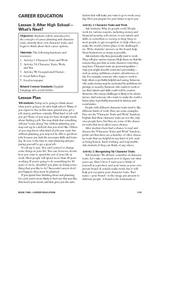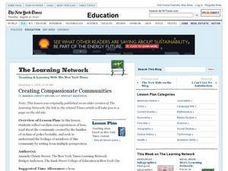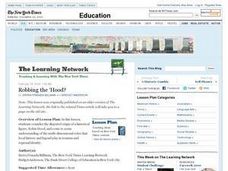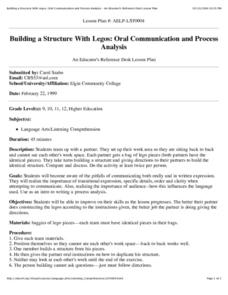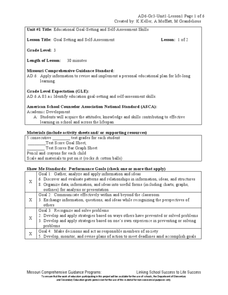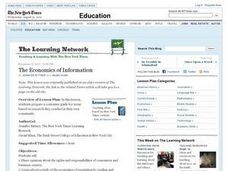Curated OER
Let There Be Peace: Nobel Prize Winners
What is the Nobel Peace Prize? After they establish criteria for great leadership, secondary learners read a New York Times article about President Jimmy Carter's acceptance of the Nobel Peace Prize in 2002. Individuals research the...
Curated OER
Fit to Be Tied (In)
How do the films we watch affect our purchasing behavior? Considering the profiles of given consumer demographics, the class analyzes real advertisements and the effectiveness of their power on consumerism. THey create posters that...
Curated OER
Critically Surfing the Web
The New York Times article “Online Diary,” launches this study of websites and how to assess them. Richly detailed, the lesson includes warm-up activities, procedures, journal prompts, discussion questions, and links to valuable...
Curated OER
That's Moor Like It!
How do modern adaptations of Shakespearean plays relate to their original source material? Middle and high schoolers focus on Shakespeare's play Othello and its screen adaptation "O" to explore how modern film adaptations of Shakespeare...
Curated OER
Validating Votes
Explore the discrepancies in Florida's vote counting process in 2000 and 2002 with this New York Times reading instructional activity. Middle schoolers study the viewpoints presented in informational text, paying attention to how...
Curated OER
Direct Effect
Discover the damage that was caused by the terrorist attacks on September 11th with your class. They will learn about the events of that day and the litigation process for damages incurred that day. Their research will cover the various...
Curated OER
Local Motives
Investigate current local elections across the United States with this New York Times reading lesson. Using informational text, middle and high schoolers research local elections and create their own news reports about what they...
Curated OER
A Way with Words
How do facts and opinions impact the news? After reading "How to Cover a War" from the New York Times, middle schoolers evaluate the claims in the article. They also consider the media's responsibilities in reporting during wartime....
Curated OER
Fanatically Grammatically Correct
Research guidelines for correct usage, then explore how creative writers employ punctuation as an essential tool in their craft. Secondary classes create board games to teach elementary school students how to properly punctuate. From the...
Curated OER
Not Just the Facts
Encourage your learners to explore the differences between hard news and news analysis. They outline a complex news analysis about the upcoming presidential election, then endeavor to write an analysis of the same topic, using local...
Curated OER
Strong Convictions
How can the rhetorical structure of an editorial help to develop its argument? Use this New York Times editorial to emphasize the importance of structure in a piece of informational text. Adolescent writers then use the editorial as a...
Curated OER
Asking the Questions and Questioning the Answers
What would you ask a presidential candidate if you had the chance? Bring politics to your language arts classroom with this lesson plan, in which young readers brainstorm questions they would have liked the presidential candidates to...
Curated OER
Children's Playthings And Books
Students categorize studenT toys by intelligence types. They review toy safety and function and identify the appropriate play age of various toys. They read and evaluate studenT books and write one of their own.
Curated OER
After High School— What’s Next?
Exploring and discovering what to do after high school graduation is a very real topic for 12th graders. They examine their own character traits, the traits commonly needed in specific careers, and what type of career best suits them...
Curated OER
Creating Compassionate Communities
Have you ever lost someone? Middle and high school learners journal about a time they experienced the loss of someone through death, divorce, moving, or another type of change. They share their responses and discuss an article relating...
Curated OER
Stop the Fighting and Start Uniting
Research current and proposed peace talks around the world with this New York Times lesson, Using the Darfur peace talks in Abuja, Nigeria as a starting point, middle schoolers create a news program on the subject. They propose a future...
Curated OER
Robbing the 'Hood?
Students investigate historical figures and how they play a role in tourism by reading and discussing the article "When Robin Hood Supped, Was it Yorkshire Pudding?" In groups, students investigate issues related in the article in...
Curated OER
Building a Structure With Legos: Oral Communication and Process Analysis
Illustrate the importance of specific details and clear directions. Sitting back-to-back, partners take turns building a Lego structure and giving directions to their partners to create an identical structure. The subsequent discussion...
Curated OER
Science in the Court Room
Share their opinions on the use of DNA databases in criminal investigations. After reading an article, they evaluate the pros and cons of the databases and work in groups to answer discussion questions. They write a letter to a state...
Curated OER
Come Fly with Me . . . Open a Book: Travels through Literature
This detailed overview of a curriculum unit suggests using travel literature to engage and stimulate your third graders’ interest in reading. The suggested reading list includes fiction and non-fiction materials and offers urban children...
Curated OER
Goal Setting and Self-Assessment
Third graders review the importance of good study habits as a skill necessary for success in school. They focus on their goals and discuss how this would help to improve grades. They determine how much an F weighs their grade down.
Curated OER
The Economics of Information
Create an expert guide to local businesses in this lesson. Through research, young readers consider their local businesses and the services they provide, paying attention to any conflicting information they might find. Working in groups,...
Curated OER
The End?
This lesson asks young readers to predict what will happen to Harry Potter. While the question has been answered by the last book and film in the series, the concept and links provided by The New York Times’ Learning Network are...
Curated OER
Reading Comprehension: Test-taking version
In this reading comprehension worksheet, young scholars explore and analyze test taking techniques, read a short story and then answer eight comprehension questions.


